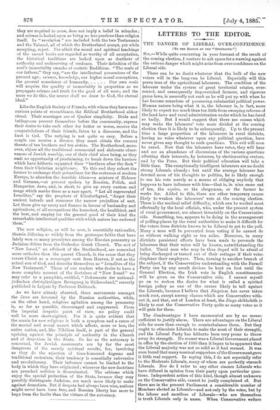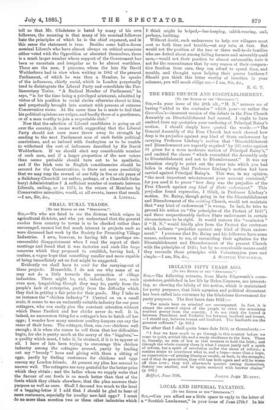LETTERS TO THE EDITOR.
THE DANGER OF LIBERAL OVER-CONFIDENCE.
pro THE EDITOR OF THE "SPECTATOR."]
SIR,—While quite concurring in your forecast of the result of the coming election, I venture to ask space for a warning against the serious danger which might arise from over-confidence on the Liberal side.
There can be no doubt whatever that the bulk of the new voters will in the long-run be Liberal. Especially will this prove true of the agricultural labourers. The condition of the labourer under the system of great territorial estates, over- rented, and consequently impoverished farmers, and rigorous game-laws, is assuredly not such as he will put up with when he has become conscious of possessing substantial political power. Human nature being what it is, the labourer is, in fact, more likely to expect too much than too little from sweeping reforms of the land-laws and rural administration under which he has fared so badly. But I would suggest that there are causes which may make the labourers' vote more divided at the coming election than it is likely to be subsequently. Up to the present time a large proportion of the labourers in rural districts, having no voice whatever upon any political question, have never given any thought to such questions. This evil will soon be cured. Now that the labourers have votes, they will hear
and see an abundance of discussions of the various questions affecting their interests, by lecturers, by electioneering orators, and by the Press. But their political education will take a little time. The exceptionally intelligent labourers are no doubt strong Liberals already ; but until the average labourer has- devoted more of his thoughts to politics, he is likely enough to use his vote merely as a means of obliging anybody that happens to have influence with him—that is, in nine cases out of ten, the squire, or the clergyman, or the farmer he works for. Added to this, there are other temporary causes- likely to weaken the labourers' vote at the coming election. There is the medical relief difficulty, which can be worked most effectually by the local officials, who, under the present system of rural government, are almost invariably on the Conservative side. Something, too, appears to be doing in the arrangement of polling-places by the rural authorities to make it difficult for the voters from districts known to be Liberal to get to the poll. Many a man will be prevented from voting if he cannot do so without walking eight or ten miles. Moreover, in many districts persistent efforts have been made to persuade the labourers that their votes will be known, notwithstanding the ballot. Timid men who may be thus duped will be afraid of being discharged or turned out of their cottages if their votes displease their employers. Then, turning to another branch of the subject, if the Conservative understanding with the Parnell Party can by any occult devices be kept on foot until the General Election, the Irish vote in English constituencies will be given on the Conservative side. I cannot myself go on to reckon the desire for what is called a spirited foreign policy as one of the causes likely to tell against the Liberals, because I believe that Jingoism has never taken much root, except among classes which are Conservative with- out it, and that, out of London at least, the Jingo shibboleth is likely to cost the Conservative Party quite as many votes as it will gain for them.
The disadvantages I have enumerated are by no means sufficient to justify alarm. There are advantages on the Liberal side far more than enough to counterbalance them. But they ought to stimulate Liberals to make the most of their strength, and the Liberal Party has hitherto been very prone to throw away its strength. No sooner was a Liberal Government placed in office by the election of 1880 than it began to be apparent that the Liberal majority was not so solid as it had seemed. It was soon found that many nominal supporters of the Government gave it little real support. In saying this, I do not especially refer to the Moderate Liberals, many of whom are perfectly staunch Liberals. Nor do I refer to any other sincere Liberals who have differed in opinion from their party upon particular ques- tions. Independent action of .this kind, though almost unknown on the Conservative side, cannot be justly complained of. But there are in the present Parliament a considerable number of Members elected as Liberals—and not only by the votes, but by the labour and sacrifices of Liberals—who are themselves in truth Liberals only in name. When Conservative writers tell us that Mr. Gladstone is hated by many of his own followers, the meaning is that many of his nominal followers hate the principles of which he is the chief exponent, and in this sense the statement is true. Besides some half-a-dozen nominal Liberals who have almost always on critical occasions either voted with the Opposition or absented themselves, there is a much larger number whose support of the Government has been so uncertain and irregular as to be almost worthless. These are the men, I presume, whom the late Sir David Wedderburn had in view when writing in 1882 of the present Parliament, of which he was then a Member, he speaks of the influences, chiefly social, which in London perpetually tend to disintegrate the Liberal Party and consolidate the Par- liamentary Tories. "A Radical Member of Parliament," he says," is for the time being a privileged aristocrat, admitted by virtue of his position to social circles otherwise closed to him, and perpetually brought into contact with persons of extreme Conservative views. At the same time he is made to feel that his political opinions are vulgar, and hardly those of a gentleman, or of a man worthy to join a respectable club."
Now that the selection of Liberal candidates is going on all over the country, it seems worth suggesting that the Liberal Party should not once more throw away its strength by sending to the next Parliament men of such feeble political convictions, and so imbued with flunkeyism as to be unable to withstand the sort of influences described by Sir David Wedderburn. If we should elect any considerable number of such men, and if a larger proportion of the new voters than seems probable should turn out to be apathetic, and if the Irish vote in English constituencies should be secured for the Conservatives, is there not some possibility that we may reap the reward of our folly in five or six years of a Salisbury-Churchill (or rather, perhaps, of a Churchill-Salis- bury) Administration ? A sufficient number of contests between Liberals, ending, as in 1874, in the return of Members by Conservative minorities, would, at all events, insure that result.



































 Previous page
Previous page